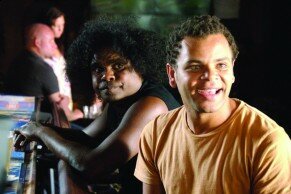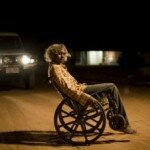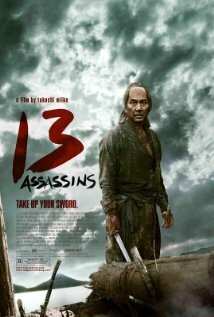The issues facing the Aboriginal population of Australia have seldom been a laughing matter until Indigenous writer/director Richard J. Frankland came along. “Every other culture in the world laughs at themselves, so why can’t we?” asks Frankland in regards to his new film Stone Bros., a stoner comedy that knows how to have a good time. In fact, Stone Bros. breaks new ground by being the first Aboriginal comedy ever in Australia, arriving just after the critical and commercial success of Warwick Thornton’s hard-hitting Indigenous love story Samson and Delilah. But as Frankland and I discussed in our interview, it’s no coincidence that these two films arrived within the same year. He believes that Australia has only recently started to embrace the work of Indigenous filmmakers, and that there’s still plenty of room for improvement.
[Note: This interview was conducted prior to my seeing of Stone Bros.]
–
CUT PRINT REVIEW: For those not familiar with your work, tell us a bit about yourself; why did you become a filmmaker?
RICHARD FRANKLAND: Being an indigenous person, I worked on the frontline of a lot of hard jobs. I started using film and music as a way to change attitudes, as ultimately there was an Australian psyche about Indigenous Australians which wasn’t, and isn’t, healthy. I see that when you have art, you have voice and when you have voice, you have freedom. And with freedom comes responsibility. In my opinion, any artist has the obligation to contribute to the cultural tapestry of the country.
So I started making films and a film was made about a particular death I investigated when I was Investigating [Aboriginal] Deaths in Custody for the Royal Commission, called Who Killed Malcolm Smith. It became part of the curriculum for a whole bunch of schools, universities and community groups. I then went on to make a film called No Way to Forget. I made that because Wal Saunders had started the Indigenous Branch of the Australian Film Commission and created a programme called ‘Sand to Celluloid’, which Warwick Thornton [Samson and Delilah] and myself were part of. That was in the early to mid 90s, so it was a long time ago!
But despite the fact that I had won 20-30 awards around the world by that point, the time wasn’t right for me, as an Indigenous person, to break into feature films.

|
Are you saying you weren’t ready, or that Australia wasn’t ready?
Yeah, I was ready, but the nation wasn’t.
Essentially, in the early 90s there was about 10,000 hours of film footage with Aboriginal content matter at the Institute of Aboriginal and Torrens Straight Island studies. Some incredible figure like 98% of it was written, directed and produced by white people. So we had no voice, no power. As a storyteller, I don’t have the luxury of just making art, I have to facilitate voice. If I had the luxury of just making art, I probably wouldn’t be an artist!
Do you think that the success of films like Samson and Delilah indicates that this endemic attitude has changed?
Yeah, but I think it was imposed on them to change. After the success of Samson and Delilah and now with Stone Bros. and Brand New Day coming out, I think that, in the words of Bernard Bouries of the St Tropez Film Festival, the next major wave of filmmakers to take Europe by storm will be indigenous Australians. My opinion is that Australia should grab hold of us as their own, and be fiercely proud of us. It’s disappointing when you look around and see that some states – Victoria for example – don’t have a policy for Indigenous filmmakers.
Ok, so let’s talk about your new film Stone Bros. How’d you come up with the idea for an Aboriginal stoner comedy?
Beer. [laughs] Mainly drinking beer and tequila, while sharing stories with mates.
[laughs] The fact that this is a comedy is something quite unique in itself. Using humour to explore the issues facing Indigenous Australians is not something we’ve really seen before.
Yeah, it’s the first Aboriginal comedy ever in Australia. I think that reconciliation is a great way to laugh, and laughing is a great way to reconciliate. This film is about saying to the world, “Ok, so you’ve seen and heard sad stories, and it’s important to keep telling those stories, but Aboriginal people laugh too. And it’s ok for you guys to laugh with us.” First and foremost, this is a comedy about having a good time. There are messages in it; if you’re intelligent enough to get the messages, get them. If you just want to go along and have a laugh, have a laugh.
Henry Reynolds said in his book Why Weren’t We Told? that “they believed in equality, but only in the equality of the elite”, meaning of course the aristocracy. Everyone else was sub-human. And that’s an endemic attitude that’s stayed around for a long long time. How do we break that? How do we get around it? How do we stop being desensitised by media? How do we humanise what’s been dehumanised? The number one way is giving people access. The number two is giving them licence. So that’s why we’re saying; “come on, laugh with us.” Actually, no, we’re saying “let’s laugh together.”

|
I think you’re right about access. As critically acclaimed films like Samson and Delilah are, you still won’t find many teenagers who have seen it. But by using comedy, you’re attracting those demographics who haven’t really been exposed to, or interested in, Aboriginal films before.
Yeah, it probably won’t win awards, but it’s making people feel good. I mean, I sat in a cinema with 500 white people laughing at this film, and they were absolutely roaring. I just sat back and thought, ‘wow, this is awesome.’ And we may be able to do this right across the country, maybe right across the world.
Has there been any concern that, by using farcical humour, you’re trivialising the issues facing Aboriginal Australians?
No, because they’re my issues as well. Every other culture in the world laughs at themselves, so why can’t we? We need to be able to laugh. Again, I come back to the point of ‘humanise what’s been dehumanised’.
In fact, in one of our screenings there were people from 40 nations from around the world, all indigenous, watching the film. There were 1200 people, roaring with laughter from the opening frame to the end. It was great! There was a 10 minute standing ovation; I couldn’t get off the stage! I wanted to, I really needed to pee. [laughs]
But yeah we’ve had a broad range of people see this film, and what I love is that indigenous people laugh at some spots that whitefellas don’t laugh at, whitefellas laugh at some spots that blackfellas don’t, and oldies laugh at some spots that young people don’t but there are some parts that everyone laughs together. And that wasn’t a deliberate thing, it just evolved.
So for aspiring screenwriters out there, what is the secret to writing good comedy?
Well my secret is dance with the devil, sleep with the angels and have a drink with those in between! [laughs]
I’ve discovered that when you write comedy, you basically just gotta take off the gloves and go for it. Write your wish list, you know, write as much as you possibly can, and then trim it back down after. And when you’re on the set filming, just be prepared — be a gunslinger ready to shoot at anything.
Stone Bros. is your first feature film; was it a smooth transition from documentaries and television to the big screen?
Oh yeah, it’s been great. It really depends on the people you’ve got around you. Communication is the key; listening to people and taking on board new ideas. Filmmaking’s always about creating, recreating and recreating the story again. My purpose as the director is to give that story a voice.

|
What advantages do you see filmmaking having over other art forms you use – music, theatre, writing and so forth – when it comes to facilitating that voice?
Well I use all the art forms that I can. I mean, there are some people who just like listening to music, others who like going to the theatre and, of course, those who like going to see films. So I like to tap into all the different forms. Each time I’m in one art from, it doesn’t diminish the others, it just means that at the time it’s the most important.
The film’s recently been in the media surrounding its MA15+ rating, which is about to be re-reviewed by the classification board. What’s the reason behind all this?
We raised the concern for a number of reasons; one is that nobody that I’ve spoken to and has seen the film thinks its MA15+, they think it’s too harsh. Two, the Film Classification Board made an error when they judged the film, saying that a scene showing a Marijuana plant was in it when it wasn’t in it at all. It wasn’t filmed and wasn’t ever in the script. And even though they made a bungle, the onus of proof was on us, which is just not acceptable. So the ministers order a review and we’re going to put our case forward, and if the decision does get reversed it will be a good thing for the Film Classification Board. I mean, I think if they’re making those types of errors, which are impacting on people’s lives, they need to analyse those errors and see why it is they are making those errors. It’s totally unacceptable.
[Update: since this interview, Stone Bros. was re-reviewed by the classification board, but its MA15+ rating remained unchanged. Read an article on this decision here.]
So what’s your next project?
Well I’ve got an album coming out and I’m halfway through another book. I’ve also got two academic papers I’m writing, there’s a play I’m doing and a film on lateral violence – which is about violence in communities, emotional spiritual and physical.
Wow, you’re definitely keeping busy! Would you ever be interested in doing a film that’s not in some way about Indigenous Australians?
Absolutely. I mean, the only non-Indigenous thing I’ve directed is Blue Healers. Every other script I’ve been given, bar one, has indigenous subject or content matter. And I was a man when I directed Blue Healers. I wasn’t just a black man, I was a man.
–
 Follow the author Anders Wotzke on Twitter.
Follow the author Anders Wotzke on Twitter.















